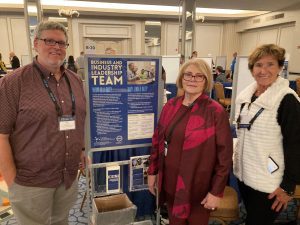Ten Things We Heard at the ATE Principal Investigators Conference
Staff from the National Convergence Technology Center (CTC) recently attended NSF’s annual Principal Investigators conference for the Advanced Technological Education (ATE) program which was held in-person in Washington DC for the first time since 2019. The CTC was a part of two sessions – a demonstration entitled “How to Create National Skill Standards and Implement IT Skill Standards Created” and a panel talk entitled “Strategically Engaging Employers to Strengthen Technical Program.” Both pushed the essentials of successfully implementing the BILT (Business and Industry Leadership Team) model to strengthen the relationship between educators and employer councils. The BILT was also the focus of the CTC’s exhibit hall table.

The “How to Create National Skill Standards and Implement IT Skill Standards Created” session also featured a look at the work of the “IT Skill Standards 2020 and Beyond” project grant, which used a modified version of the BILT model to work with employers in developing skill standards for several in-demand IT job clusters. Learn more about the ITSS project here.
Aside from that, the National CTC attended a few other sessions and keynote presentations. Below are a few of the more interesting and memorable statements and perspectives we heard.
1. If we can agree that “skill = talent x effort” and that “achievement = skill x effort,” then effort counts twice as much as talent. Students need to understand that hard work will pay off.
2. One community college noted that because 70% of its faculty pre-COVID had never taught online, leading to a massive re-skilling program, they now ask all new faculty to undergo a five-hour training program. This has also helped workforce hires who may be unfamiliar with teaching. That training includes DEI (diversity, equity, inclusion) topics, which helps the faculty member think about how their culture might unintentionally create classroom bias.
3. Always close-caption videos even if there’s no one in the class specifically asking for accommodations. Think about the student who’s at work on a break trying to discreetly watch the video. In other words, make accommodations like this for everyone, not just because someone asked.
4. One of the biggest predictors of future success is “openness to experience.” which includes an active imagination, daydreaming, planning for the future, and reading fiction.
5. One employer coined a term for that new hire who likes to stir things up and make a mess of everything – a “spooner.” Obviously, employers don’t want spooners.
6. When recruiting employers to join business councils, don’t pose a generic “Do you want to work with us?” question. Be specific. Also try to keep the initial ask small and simple. Think of developing a relationship with employers as dating. Don’t overwhelm them and scare them off on the first date.
7. Explain to students the value of advising. They shouldn’t think of it as a chore. It’s a valuable opportunity.
8. It can be a challenge when your program strives to promote inclusion and diversity, but then a graduate gets hired at a company that isn’t as inclusive or diverse. This is why it’s important to give students in advance a “tool box” to help them better navigate those situations.
9. One school brings together students and employers with “learn from others” events, where the first half of the event is mingling and networking and then the second half is a more structured presentation with a speaker offering industry perspectives and job seeking tips. The school reports that hiring happens at those events.
10. One college conducted a study and learned that heavy caseloads and high turnover among college advisors – both common problems – created big challenges for students who need consistency and clear messaging to succeed.
